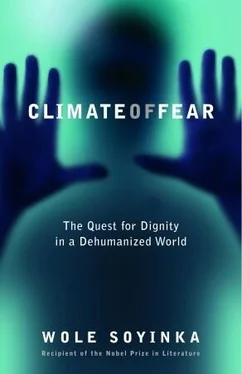That fear went, predictably, beyond artistic expressions and provoked practical responses. There were protest marches, Aldermaston being perhaps the pioneer and the most famous of them all. I took part in some of these, enjoyed their carnival atmosphere that was laced with purpose. I was filled with excitement at participating in what struck me as a preemptive course of action by civil society. I felt that I was part of a universal undertaking — not to mention the thrill of actually marching in the company of the British philosopher Bertrand Russell, incidentally the first Reith lecturer in 1948. My fond recollection of him remains that of a pipe-smoking leprechaun of a man with a giant brain, whose atheism was grounded in a faith that man’s first allegiance was to his kind, and that science must always be subject to humanistic considerations.
As the saber rattling grew louder during this Cold War, and the superpowers raced to surpass one another in mounting bigger and better explosions and to sneak a few of the deadly pods into the backyards of their ideological rivals, the fear of the atom bomb grew so affective that a few of my European acquaintances chose not to have any children, declaring that they were not about to provide fodder for the inevitable nuclear consummation. Some formed artist colonies on remote islands where they established communes, leading a simple life, culturing seaweed — for some reason that I cannot now recall — while they awaited the inevitable, from which, however, they fully expected to be spared. Folksingers such as Pete Seeger became cult figures on international circuits for their antinuclear lyrics. Tom Lehrer’s songs, laced with grim, apocalyptic humor, became a staple diet for student and antiestablishment caucuses, while the great baritone Paul Robeson lent credence to a great communist conspiracy by his appearances at socialist peace rallies in France, where the antinuclear theme overwhelmed virtually every other global concern.
Within my own continent, however, it would have been virtually impossible to find one extreme example of the preemptive strategies that were adopted by the artist colonies of Europe, not even when the French rode roughshod over the protestations of African nations and detonated the first nuclear device on African soil in the middle of the last century. Africans were already inured to other forms of fear, and a nuclear conflagration was such an exotic threat that the French explosion remained a pure political aggravation, not one that ever translated into a visceral fear. Today, few of us on the continent will deny that the circumstances, and the dimension, of the current face of fear have transformed awareness even in our normally immune corners of the globe and brought into immediacy the charms of Europe’s artistic exodus. The only trouble is, such overactive imaginations will find it difficult to think of a secure destination. Events of a hitherto unimaginable dimension have rendered virtually every corner of the globe vulnerable.
Reality is indeed catching up with science fiction, or, shall we now simply say, history is repeating itself in a phenomenon that appears to have been cloned from fiction. I refer to that perennial motif of the literature of megalomania, a fascination with the notion of one individual’s obsession to dominate the world — to be distinguished from ruling, or governing, simply to dominate —that stuff of science fiction that found reality in the historic aberration of an Adolf Hitler. Now James Bond 007 moves beyond fantasy derring-do where the global sword of Damocles is an orbiting satellite, awaiting the push of a button unless a hundred billion euros are paid into a special account and the whole world acknowledges a new Master of the Universe, ensconced in the bowels of some inaccessible island. However, even the orbiting pod of destruction has its limitations in in-stilling universal fear. Far more effective is the domesticated agency whose very ordinariness is more terrifying than the sophisticated bomb, and is inversely proportionate to the bomb’s lethal reach. A sachet of sarin is located no one knows where, but is ready to be punctured when the signal is given. The banal shopping bag left innocuously at the entrance to a metro station is eyed as a potential enemy, capable of devastation less dramatic than, but every bit as awesome as, a plane hurtling down from the sky in a ball of flames.
In 1989, less than a year after Lockerbie, a UTA passenger flight — UTA, like Pan Am, has since collapsed — was brought down by an act of sabotage over the Republic of Niger. That event was swallowed with total equanimity by African heads of state. Was this from policy, the tranquilizing pill of African and/or Third World solidarity, that catechism of historic victims of European imperialism that urged them to close ranks in the face of any accusations by the historic oppressors of the world? Or did this muteness emanate from fear of probable reprisal by the aggressor, who was predictably intolerant of any voice — within or without — that dared to criticize its methods of anti-imperialist challenge?
That silence, I confess, gave me pause, and here is why. In the original lecture to which I referred at the beginning—“Climates of Art”—when French arrogance sought to spread the fear of the nuclear holocaust to African soil, even during that immediate postindependence stage of insecure nationhood, I lauded the fact that African states had not hesitated to act in concert. The outrage of a continent was vocal and sustained. France was declared a pariah nation, and numerous African countries broke diplomatic relations with the arrogant Gauls for infesting African soil with nuclear fumes. The economic consequences, in the main, were bravely ignored. On a personal level, since that outrage coincided with my début on the stage of the Royal Court Theatre in London — one of those experimental one-night stands on a Sunday — I declaimed an angry poem in condemnation of such an act of continental disdain. Indeed, the recent hysterical mood of resentment in the United States over the refusal of France to jump into an unnecessary U.S.-promoted war with Iraq was nothing compared with the mood of the African continent when France, despite stern warnings, went ahead and detonated its atom bomb.With that concerted response on my mind, I think I could be forgiven for expecting no less than the same heated reaction when a plane was deliberately blasted out of African skies.
Nothing of the sort took place. A planeload of humanity had been deliberately blown apart and, suddenly, the political touchiness of the continent appeared to have gone to sleep. None of that earlier fervor of moral outrage was forthcoming, not even a credible warning to whomever the perpetrators were to kindly take their warfare elsewhere or be confronted with the righteous anger of African nations. The commencing view on the continent was that this was a PLO gambit, aided and abetted by some Middle East allies, and there were sufficient reasons to lean toward such a view. Libya — and Gadhafi — entered the list of suspects some time later.
That studied muteness, I felt, could only be born out of fear. The political club that was then the Organization of African Unity made only the most tepid statements of condemnation. If it set up its own technical commission of investigation, it must have been deliberately low-key, an apologetic step that was shrouded in mystery — for fear of reprisals? Political cowardice or a lack of moral will, what dominated the thinking of many African leaders was, frankly, “Let us keep mute and maybe he will exempt us from his current revolutionary rampage, or at least exercise his restraining influence and cloak us in selective immunity.” They had only to recall that Libya, headed by a young maverick called Gadhafi, was then at the height of its powers. It advertised a progressive, even radical, agenda, one that threatened corrupt as well as repressive governments, provided a training ground for dissidents of the left, right, or indeterminate — and not merely on the African continent. In short, the fear of Libya was the beginning of wisdom.
Читать дальше












